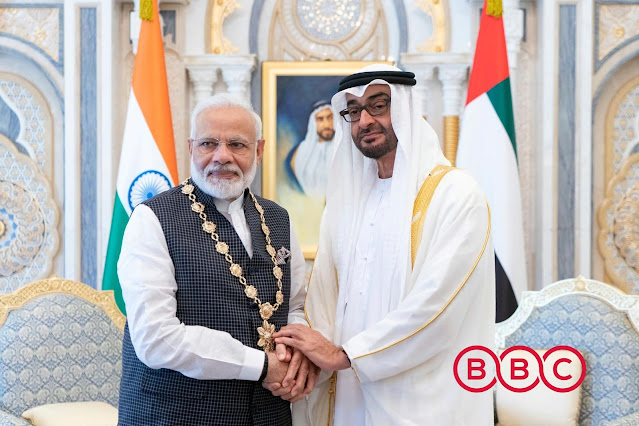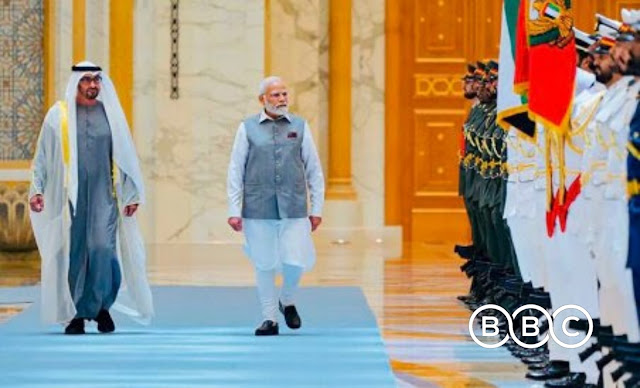New Dehli: (Tamsil Shahezad Khan) During Prime Minister Narendra Modi's visit to Abu Dhabi, India and the United Arab Emirates (UAE) have taken a significant step towards enhancing their economic cooperation. The two countries have signed agreements to facilitate trade settlement in their respective national currencies, the Indian Rupee and the UAE Dirham. Additionally, they have agreed to link their fast payment systems, aiming to simplify international financial transactions.
Prime Minister Modi's visit to Abu Dhabi, following his trip to Paris, was met with a warm welcome from UAE President Sheikh Mohamed bin Zayed Al Nahyan at the airport. The leaders seized the opportunity to exchange ideas and strengthen bilateral ties, resulting in the signing of two joint statements. Notably, one of these statements emphasized cooperation on climate change, highlighting the urgent need for developed nations to fulfill the $100 billion delivery plan outlined in the Paris Agreement. The UAE will also host the 2023 United Nations Climate Change Conference (UNFCCC COP28) in Dubai later this year.
In terms of economic collaboration, both Prime Minister Modi and President Al Nahyan expressed their satisfaction with the increasing trade between India and the UAE. Since the signing of the Comprehensive Economic Partnership Agreement last year, trade between the two countries has witnessed a substantial 20 percent increase, reaching $85 billion. The leaders are optimistic about achieving the target of $100 billion soon, with the possibility of surpassing this milestone even before the G20.
To further promote economic ties, the Reserve Bank of India (RBI) Governor Shaktikanta Das and his UAE counterpart, Khaled Mohamed Balama, signed a Memorandum of Understanding (MoU) establishing a framework for using local currencies in cross-border transactions. This historic agreement aims to develop a Local Currency Settlement System (LCSS) that will enable exporters and importers to invoice and pay in their domestic currencies. By facilitating the use of the Indian Rupee and the UAE Dirham, the LCSS will optimize transaction costs and settlement time, benefiting businesses and individuals, including Indian residents in the UAE.
The newly created LCSS has already been successfully used for a gold transaction between an Emirati gold exporter and an Indian party, amounting to Rs 12.84 crore for 25 kilograms of gold. This transaction exemplifies the potential and practicality of conducting cross-border trade in local currencies.
Furthermore, another MoU was signed on 'Payments and Messaging Systems,' which will pave the way for linking the fast payment systems of India and the UAE. The Unified Payments Interface (UPI) of India will be connected with the Instant Payment Platform (IPP) of the UAE, allowing users in both countries to make fast, secure, and cost-effective cross-border fund transfers. Additionally, the linkage of card switches (RuPay switch and UAESWITCH) will enable the mutual acceptance of domestic cards and facilitate card transactions. The MoU also explores the integration of the Structured Financial Messaging System (SFMS) of India with the messaging system in the UAE, streamlining financial communication between the two nations.
The agreements signed during Prime Minister Modi's visit signify the growing economic cooperation and mutual trust between India and the UAE. By reducing dependence on the US dollar and promoting cross-border transactions in local currencies, both countries are taking proactive steps to strengthen their economic ties and boost trade relations. These developments are expected to have a positive impact on investment, remittances, and the overall economic growth of India and the UAE.


